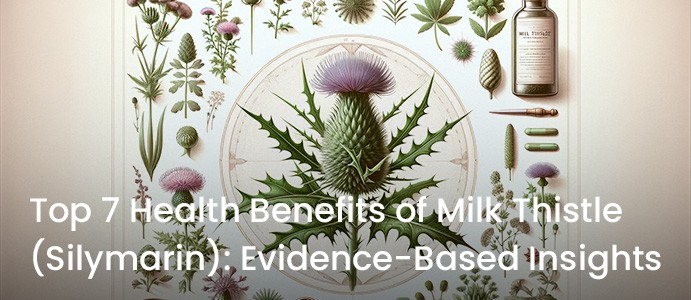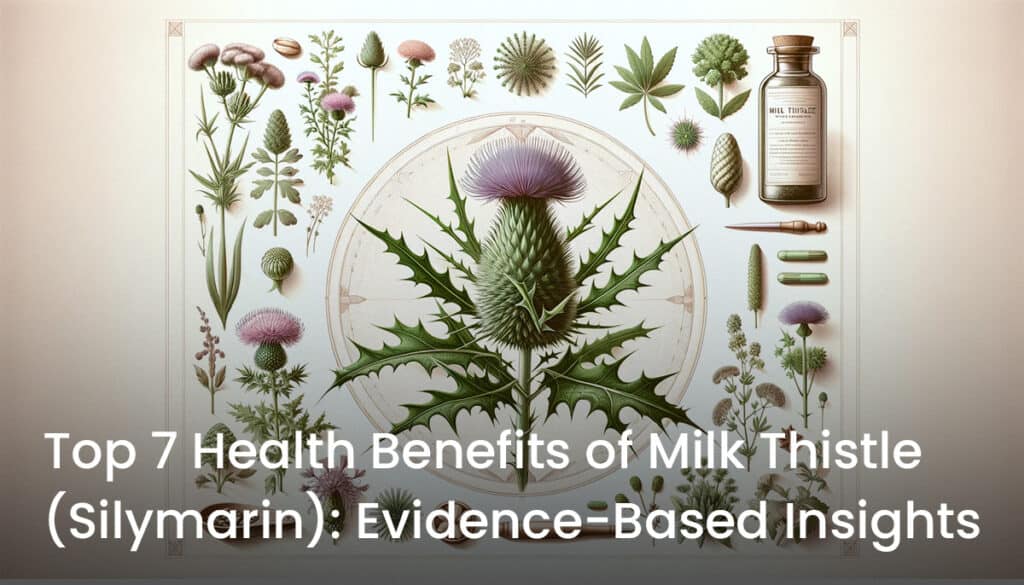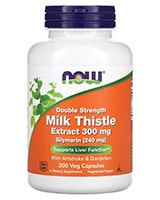

Introduction
Milk thistle, scientifically known as Silybum marianum, is a plant with a long history of use in traditional medicine, primarily for treating liver and gallbladder disorders. The plant is notable for its distinctive purple flowers and white-veined leaves, from which its primary active ingredients, a group of compounds collectively called silymarin, are extracted. Silymarin’s purported health benefits, including its antioxidant, anti-inflammatory, and liver-protective effects, have attracted scientific interest, leading to numerous studies investigating its therapeutic potential.
Liver Health and Protection
Milk thistle is renowned for its liver-protective properties. It is commonly used as a complementary therapy for various liver conditions such as alcoholic liver disease, non-alcoholic fatty liver disease (NAFLD), hepatitis, and liver cancer. Research suggests that milk thistle supplementation can improve liver function[1]Mirhashemi, S. H., Hakakzadeh, A., Yeganeh, F. E., Oshidari, B., & Rezaee, S. P. (2022). Effect of 8 Weeks milk thistle powder (silymarin extract) supplementation on fatty liver disease in patients candidates for bariatric surgery. Metabolism Open, 14. https://doi.org/10.1016/j.metop.2022.100190 by reducing liver inflammation and liver damage. Several studies have demonstrated its ability to protect the liver against toxins, including those from alcohol and environmental pollutants, by reducing the production of free radicals during the liver’s detoxification process.
Antioxidant and Anti-inflammatory Properties
The antioxidant properties of milk thistle play a crucial role in its health benefits. Silymarin, the active compound in milk thistle, helps combat oxidative stress[2]Khazaei, R., Seidavi, A., & Bouyeh, M. (2021). A review on the mechanisms of the effect of silymarin in milk thistle (Silybum marianum) on some laboratory animals. Veterinary Medicine and Science, 8(1), 289-301. https://doi.org/10.1002/vms3.641, a key factor in the development of chronic diseases. Its anti-inflammatory effects further contribute to its therapeutic potential, offering benefits for conditions characterized by chronic inflammation. These properties make milk thistle a subject of interest for researchers looking into natural ways to prevent and treat chronic health issues.
Support for Heart Health
Emerging research points to milk thistle’s potential benefits for heart health. By influencing cholesterol levels, milk thistle may help reduce the risk of heart disease. Studies have shown that it can lower LDL (bad) cholesterol and potentially improve cholesterol profiles[3]Graedon, T. (2024, February 06). Will You Lower Your Cholesterol With Milk Thistle? Retrieved from https://www.peoplespharmacy.com/articles/will-you-lower-your-cholesterol-with-milk-thistle, which is crucial for heart health. Additionally, milk thistle has shown promise in managing type 2 diabetes and improving insulin resistance, factors that are closely linked to heart disease risk.
Cancer Prevention and Support
Milk thistle’s antioxidant properties extend to potential applications in cancer prevention and treatment. The active compounds in milk thistle, particularly silymarin, have been studied for their ability to inhibit the growth of cancer cells[4]Koltai, T., & Fliegel, L. (2022). Role of Silymarin in Cancer Treatment: Facts, Hypotheses, and Questions. Journal of Evidence-Based Integrative Medicine, 27. https://doi.org/10.1177/2515690X211068826 and enhance the efficacy of chemotherapy drugs. While research is ongoing, some studies suggest that milk thistle may protect against certain types of cancer by preventing the proliferation of cancer cells and inducing apoptosis (programmed cell death). However, more clinical trials are needed to fully understand its efficacy and mechanism of action in cancer therapy.
Neuroprotective Effects
The neuroprotective effects of milk thistle are gaining attention for their potential to safeguard brain health. Silymarin’s antioxidant and anti-inflammatory properties may help prevent age-related decline in brain function[5]Surai, P. F. (2015). Silymarin as a Natural Antioxidant: An Overview of the Current Evidence and Perspectives. Antioxidants, 4(1), 204-247. https://doi.org/10.3390/antiox4010204 and protect against neurological conditions such as Alzheimer’s and Parkinson’s disease. Animal and in vitro studies have shown that milk thistle can reduce oxidative stress and inflammation in the brain, potentially slowing the progression of neurodegenerative diseases. However, human studies are limited, and further research is required to confirm these benefits.
Skin Health and Anti-aging
Milk thistle’s benefits for skin health are attributed to its antioxidant and anti-inflammatory properties, which can help improve inflammatory skin conditions and protect the skin from damage. Topical application of milk thistle extract has been found to have anti-aging effects[6]Akhtar, N. (2012). Anti-aging potential of a cream containing milk thistle extract: Formulation and in vivo evaluation. AFRICAN JOURNAL OF BIOTECHNOLOGY, 11(6). DOI:10.5897/AJB11.2678, reducing the appearance of fine lines and wrinkles by protecting the skin against oxidative stress. Furthermore, milk thistle may offer protection against UV-induced skin damage, making it a valuable component in natural skincare formulations. Despite promising findings, more research is necessary to fully establish its effectiveness in skin health and anti-aging.
Digestive Health Support
Traditionally, milk thistle has been used to treat various digestive disorders[7]Navarro, V. J., Belle, S. H., D’Amato, M., Adfhal, N., Brunt, E. M., Fried, M. W., Reddy, K. R., Wahed, A. S., Harrison, S., & Silymarin in NASH and C Hepatitis (SyNCH) Study Group. Silymarin in non-cirrhotics with non-alcoholic steatohepatitis: A randomized, double-blind, placebo controlled trial. Retrieved from https://pubmed.ncbi.nlm.nih.gov/31536511/, including indigestion and gallbladder issues. Its anti-inflammatory and antioxidant effects may contribute to improving symptoms of indigestion and enhancing gallbladder function. Some studies suggest that milk thistle, in combination with other supplements, can improve the symptoms of indigestion by supporting liver function and reducing inflammation. However, as with many of its other uses, more research is needed to confirm these effects and determine the optimal dosage for digestive health support.
Safety, Dosage, and Side Effects
Milk thistle is generally considered safe for most people when taken in appropriate doses. The most common side effects include gastrointestinal problems such as diarrhea, nausea, bloating, and occasionally allergic reactions, especially in individuals allergic to plants in the same family, like ragweed, daisies, and marigolds. Despite its wide usage, the optimal dosage of milk thistle remains unclear due to variability in study designs and formulations used. Dosages in studies have varied widely, with some evidence suggesting benefits at doses ranging from 140 to 800 mg of silymarin daily. It’s crucial to consult a healthcare provider before starting milk thistle, particularly for individuals with existing health conditions or those taking medications, as milk thistle can interact with various drugs, including those metabolized by the liver’s enzyme system.
Conclusion
Milk thistle (Silymarin) has been extensively studied for its potential health benefits, including liver protection, antioxidant and anti-inflammatory effects, support for heart health, cancer prevention, neuroprotective effects, skin health improvement, and digestive health support. While the evidence is promising, further research, particularly in human clinical trials, is necessary to fully understand its efficacy, optimal dosages, and mechanisms of action. As with any supplement, it’s important to approach milk thistle with caution and consult a healthcare professional to ensure it’s appropriate for your individual health needs and circumstances. With its long history of use and growing body of research, milk thistle remains a subject of interest in the natural health community and may offer supportive benefits as part of a holistic approach to health and wellness.
Buy Milk Thistle (Silymarin) Online Review Comparison Table
 Milk thistle (Silymarin) | iHerb | 200 pills (300mg) | $23.09 |  Worldwide, AU | Visit Website >> |
References
| ↑1 | Mirhashemi, S. H., Hakakzadeh, A., Yeganeh, F. E., Oshidari, B., & Rezaee, S. P. (2022). Effect of 8 Weeks milk thistle powder (silymarin extract) supplementation on fatty liver disease in patients candidates for bariatric surgery. Metabolism Open, 14. https://doi.org/10.1016/j.metop.2022.100190 |
|---|---|
| ↑2 | Khazaei, R., Seidavi, A., & Bouyeh, M. (2021). A review on the mechanisms of the effect of silymarin in milk thistle (Silybum marianum) on some laboratory animals. Veterinary Medicine and Science, 8(1), 289-301. https://doi.org/10.1002/vms3.641 |
| ↑3 | Graedon, T. (2024, February 06). Will You Lower Your Cholesterol With Milk Thistle? Retrieved from https://www.peoplespharmacy.com/articles/will-you-lower-your-cholesterol-with-milk-thistle |
| ↑4 | Koltai, T., & Fliegel, L. (2022). Role of Silymarin in Cancer Treatment: Facts, Hypotheses, and Questions. Journal of Evidence-Based Integrative Medicine, 27. https://doi.org/10.1177/2515690X211068826 |
| ↑5 | Surai, P. F. (2015). Silymarin as a Natural Antioxidant: An Overview of the Current Evidence and Perspectives. Antioxidants, 4(1), 204-247. https://doi.org/10.3390/antiox4010204 |
| ↑6 | Akhtar, N. (2012). Anti-aging potential of a cream containing milk thistle extract: Formulation and in vivo evaluation. AFRICAN JOURNAL OF BIOTECHNOLOGY, 11(6). DOI:10.5897/AJB11.2678 |
| ↑7 | Navarro, V. J., Belle, S. H., D’Amato, M., Adfhal, N., Brunt, E. M., Fried, M. W., Reddy, K. R., Wahed, A. S., Harrison, S., & Silymarin in NASH and C Hepatitis (SyNCH) Study Group. Silymarin in non-cirrhotics with non-alcoholic steatohepatitis: A randomized, double-blind, placebo controlled trial. Retrieved from https://pubmed.ncbi.nlm.nih.gov/31536511/ |

Leave a Reply